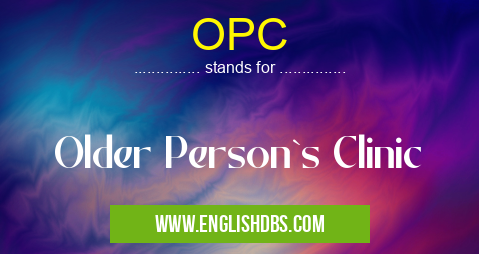What does OPC mean in MEDICAL
OPC stands for Older Person's Clinic. It is a specialized healthcare facility that provides comprehensive medical and social services to senior citizens. OPCs aim to promote healthy aging, prevent and manage chronic conditions, and enhance the overall well-being of older adults.

OPC meaning in Medical in Medical
OPC mostly used in an acronym Medical in Category Medical that means Older Person`s Clinic
Shorthand: OPC,
Full Form: Older Person`s Clinic
For more information of "Older Person`s Clinic", see the section below.
Services Offered by OPCs
OPCs typically offer a wide range of services tailored to the specific needs of older adults, including:
- Medical Services: Primary care, chronic disease management, geriatric assessments, vaccinations
- Social Services: Case management, counseling, support groups, transportation assistance
- Educational Programs: Health education, nutrition counseling, exercise classes
- Falls Prevention Programs: Balance training, home safety assessments
- Dementia Care Services: Diagnosis, management, support for caregivers
- Advance Care Planning: Discussions about end-of-life care and preferences
Benefits of Attending an OPC
There are numerous benefits to attending an OPC, including:
- Improved Access to Healthcare: OPCs provide convenient and specialized care for older adults, reducing barriers to accessing healthcare.
- Comprehensive Care: OPCs offer a holistic approach to healthcare, addressing both physical and social needs.
- Early Detection and Intervention: OPCs can help detect and manage chronic conditions early on, improving outcomes and preventing complications.
- Support and Education: OPCs provide a supportive environment where older adults can connect with others, learn about health and well-being, and access resources.
Essential Questions and Answers on Older Person`s Clinic in "MEDICAL»MEDICAL"
What is an Older Person's Clinic (OPC)?
An OPC is a specialized healthcare clinic that provides comprehensive medical, social, and support services to older adults, typically those aged 65 and above. These clinics aim to promote healthy aging, prevent or manage age-related conditions, and enhance overall well-being.
What services are offered at an OPC?
OPCs typically offer a wide range of services tailored to the needs of older adults, including:
- Medical checkups and screenings
- Medication management
- Chronic disease management (e.g., diabetes, heart disease)
- Geriatric assessments to evaluate functional abilities and cognitive health
- Counseling and support for mental health issues
- Social services (e.g., housing assistance, transportation)
- Community outreach and education programs
Who should consider attending an OPC?
OPCs are particularly beneficial for older adults who:
- Are experiencing age-related health concerns
- Have multiple chronic conditions
- Need assistance with medication management
- Are at risk for social isolation or loneliness
- Desire proactive healthcare and support to maintain their well-being
How do I access services at an OPC?
Access to OPC services typically requires a referral from a primary care physician or other healthcare provider. Once referred, you will undergo an initial assessment to determine your individual needs and develop a personalized care plan.
What are the benefits of attending an OPC?
Attending an OPC offers numerous benefits, including:
- Improved health outcomes through proactive care and disease management
- Enhanced quality of life through social and support services
- Reduced healthcare costs by preventing or delaying complications
- Peace of mind knowing that your healthcare needs are being addressed
Final Words: OPC is an invaluable resource for older adults, providing a wide range of services and support to help them live healthy, active, and fulfilling lives. By attending an OPC, seniors can access specialized healthcare, social services, and educational programs that are tailored to their specific needs.
OPC also stands for: |
|
| All stands for OPC |
